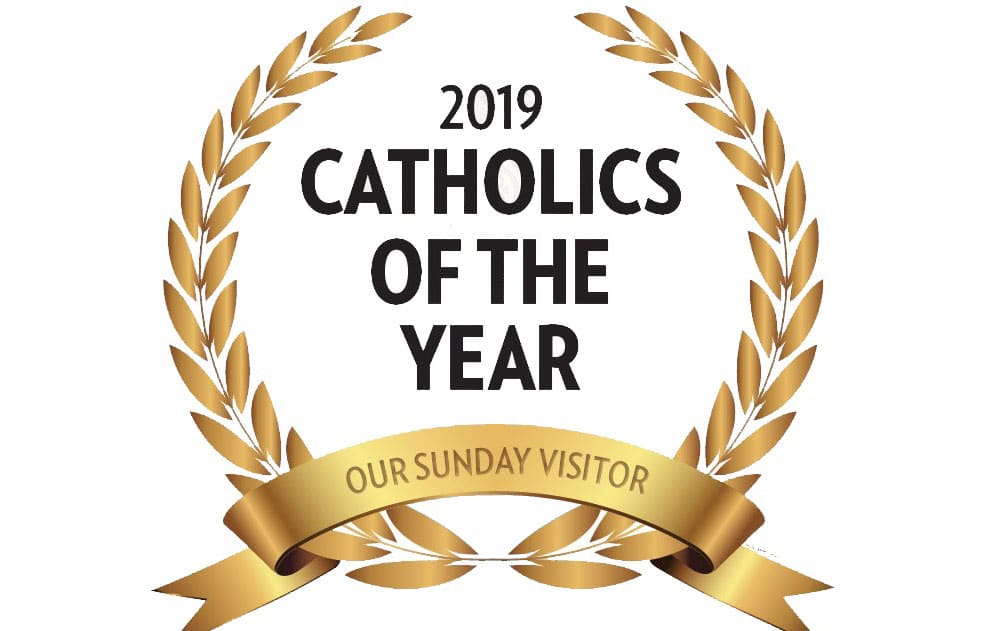Some say that numbers never lie, and while that might be the case, they certainly don’t always tell the whole story. That is evident as we look back at the past year.
It seemed like every week of 2019 a new poll, study or survey was published that showed the disintegration of religion in our society: The percentage of Americans who identify as Christians has plummeted in the past decade; the religiously unaffiliated (or “nones”) continue their rapid growth; fewer and fewer Catholics believe in the Real Presence of Christ in the Eucharist; dioceses across the country are projected to pay out billions of dollars in settlements to survivors of clergy sexual abuse.
These are all worrisome statistics, but to focus on these exclusively is a disservice to the faithful, because they paint an incomplete picture of the Body of Christ. What they ignore are those countless individuals who continue to persevere in the Faith, who are choosing to serve God and others as faithfully as they can.
Our Sunday Visitor is proud to honor eight such people — clergy, religious and lay Catholics who have inspired others through the faithful witness of their lives. We thank them for their service to the Church and for being shining examples of how to follow the will of God.
ARCHBISHOP JOSÉ H. GOMEZ
Ready to serve at the right moment
By Hosffman Ospino
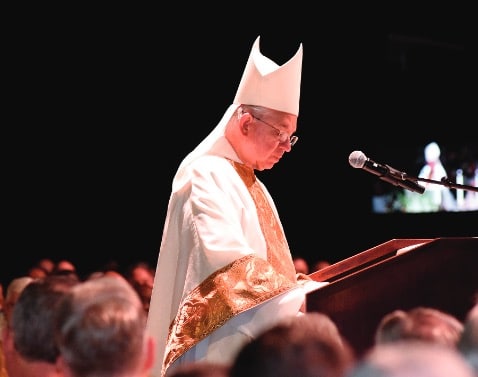
The first time I sat down with Archbishop José H. Gómez was in 2008 in his office while he was archbishop of San Antonio. The purpose of my visit was to invite him to a symposium at Boston College the following year where we would discuss the present and future of Catholic Hispanic ministry in the United States. He was enthusiastic about the idea and cleared his schedule to be in Boston for the three days of the symposium. During the gathering, he listened attentively. He spoke sparsely, yet when he did, conversations shifted.
This is what I had observed for several years and continue to observe about him as our paths cross regularly in meetings and committees at various levels. He is a man of few, yet discerning, words.
A quiet and rather reserved immigrant clergyman ended up being a trailblazer at a time when Hispanic Catholics are nearly half of the total U.S. Catholic population. One may well read Archbishop Gómez’s history as that of someone who has been there, ready to serve at the right moment. Whether such readiness is to lead a faith community, serve at top ecclesiastical posts or lead a national conversation on justice toward immigrants, he has done it well.
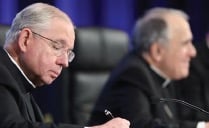
Bob Roller
He embodies the type of leadership that for many decades Hispanic Catholics have said we can offer to the institutional church. In many corners of Catholic life, Hispanics are still perceived as not ready or incapable of leading in high posts. Such view, besides being shortsighted, fails to recognize many of the gifts the Holy Spirit is bestowing upon the Church in the United States through the Hispanic population.
In recognizing Archbishop Gomez as one of the Catholics of the Year for 2019, Our Sunday Visitor also honors the countless trailblazing Hispanic Catholic leaders in this country who quietly, although with true passion, build the Church in this country today. I am glad that he attended that symposium a decade ago. This is precisely the present and the future that we were discussing.
Hosffman Ospino, Ph.D., is an associate professor of theology and religious education at Boston College.
ST. JOHN HENRY NEWMAN
Reminding the faithful of the necessary pursuit of truth
By Bishop Robert E. Barron
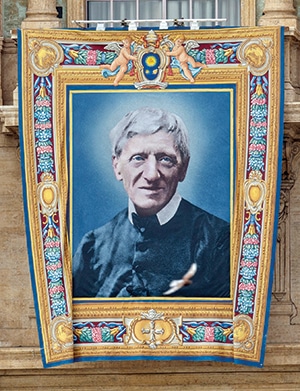
When James Joyce was told that he was the best writer of English, the great Irish novelist replied, “Nobody has ever written English prose that can be compared with that of a tiresome footling little Anglican parson who afterwards became a prince of the only true church” — referring, of course, to John Henry Newman.
But Newman was not only one of the most elegant stylists in the English language, he has also been characterized as perhaps the greatest Catholic theologian since Thomas Aquinas, and his work represents the first and most notable attempt to place Catholic thought in dialogue with the Enlightenment. He was also undoubtedly one of the most important theological influencers of the Second Vatican Council. Balthasar, Ratzinger, de Lubac — to name just a few — appreciated the great Englishman’s obvious devotion to the great Catholic tradition, and they also savored his sense of that tradition as a living organism and not a dead letter.
Newman was many things — controversialist, apologist, theologian, educator, poet — but through it all, he was a lover of the truth. Seeking the truth, especially the truth about God, was the principal passion of his life. And it remained so until his dying day, for he ordered that on his grave there should be inscribed the motto Ex umbris and imaginibus in veritatem (“From shadows and images into the truth”).
On Oct. 13, 2019, I had the joy of attending the splendid Mass of Newman’s canonization, presided over by Pope Francis and attended by tens of thousands of bishops, priests and faithful from all over the world. Hanging from the central loggia of St. Peter’s Basilica during the liturgy was a marvelous tapestry featuring a portrait of Newman, and I found myself gazing at it frequently. What would Newman have thought if someone had told him when he arrived in Rome in 1846 to commence studies for the Catholic priesthood that one day his canonization would be celebrated at St. Peter’s? He was newly converted to the Faith, seen by many of his former co-religionists as a traitor, distinctly uneasy in the Catholic intellectual environment — and would have been, I’m quite sure, utterly flummoxed.
But the Church has seen fit to declare John Henry Newman a saint and one day, I hope, a Doctor of the Church. St. John Henry Newman, one of Our Sunday Visitor’s 2019 Catholics of the Year, pray for us!
Bishop Robert E. Barron is auxiliary bishop of the Archdiocese of Los Angeles and founder of Word on Fire Catholic Ministries.
ASIA BIBI
Unwavering faith and courage in the face of persecution
By John Pontifex
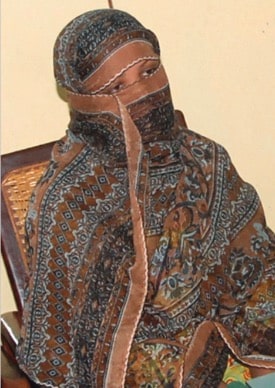
after her 2009 arrest. CNS photo via Reuters
Asia Bibi, a Catholic woman from Pakistan, was found guilty of blasphemy in 2010 — a crime she did not commit — and was sentenced to death. In the decade that followed, during which time extremist mobs bayed for her blood, she not only defended her innocence but publicly professed her faith in Jesus Christ in defiance of calls for her to save her life by converting to Islam. Her courage and determination inspired people the world over. Finally, in October 2018, her conviction was overturned by Pakistan’s Supreme Court and in May 2019 she left to start a new life with her family abroad.
The Asia Bibi case turned on what happened in June 2009 when she took a break while picking berries in a field near Sheikhupura in Pakistan’s Punjab province. She took a drink, and immediately her fellow workers accused her of defiling the water. They claimed that, as Muslims, they could not drink from vessels used by Christians. When she defended her actions, they accused her of blasphemy. An alleged confession was extracted under torture, and she was found guilty by the Lahore high court. Now on death row, Asia Bibi defended her innocence from the prison where she was held in solitary confinement. Her children, one with profound disabilities, were not allowed proper access to her.
Her untiring courage and faith over the years inspired human rights activists, politicians and the media. When family members visited her in prison in October 2018, she called on them to trust in God. Later that month, the Supreme Court of Pakistan overturned Asia Bibi’s conviction. Furious protestors responded by threatening to grind Pakistan to a standstill. But the government of Prime Minister Imran Khan held firm, and early in 2019, the Supreme Court was able to dismiss an appeal to the case. Asia Bibi is now in Canada with her family living in peace and happiness.
For her courage and steadfast faith, she is recognized by Our Sunday Visitor as one of its Catholics of the Year.
John Pontifex is head of press and information for Aid to the Church in Need in the United Kingdom.
JANICE BENTON
Helping those with disabilities be able to fully live the Faith
By Charleen Katra
Janice L. Benton, a professed secular Franciscan for 37 years, wife, mother and grandmother, is a woman of faith with a deep commitment to God’s people. Jan helped found the National Catholic Partnership on Disability (NCPD) 40 years ago and led the organization as executive director for 15 years, retiring in November. Jan’s vocation was and will continue to be to help make the Catholic Church open to people with disabilities.
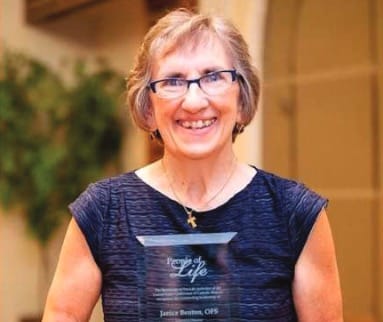
Jan’s passion for helping began as a teenager in the Archdiocese of Detroit when she volunteered to assist in a parish catechetical program for children with developmental disabilities. The spark for bringing the word of God to individuals hungry for faith — individuals with blindness, deafness, mental illnesses, intellectual disabilities, wheelchair users and any who may need accommodations to access their faith — fanned by Jan’s deep faith and determination, led to a respected national Catholic organization being established by the U.S. Conference of Catholic Bishops. Today, the NCPD serves every diocese and eparchy in the United States and has contributed to international conferences at the Vatican.
Through Jan’s leadership, disability ministry became integrated into other Church ministries such as catechesis, Catholic education, cultural diversity, divine worship, marriage and family Life, pro-life, social concerns, vocations and youth. Through Jan’s leadership, the U.S. bishops revised their Guidelines for the Celebration of the Sacraments with Persons with Disabilities to give bishops, pastors and catechists clear directives for providing all members of the Body of Christ the opportunity to be nourished by the grace of the sacraments.
Through Jan’s leadership, clergy with vision loss can receive large-print Roman Missals and Lectionaries. Through Jan’s leadership, the NCPD has become the model for accessibility for Church leaders, demonstrating bilingual print materials, captioned video production, sign language interpretation for the deaf, real-time captioning and accessible altars and lecterns. Through Jan’s leadership, NCPD is the go-to resource for foundational materials to equip individuals, families, parishes and dioceses to form disciples in Christ.
In honoring her as one of its Catholics of the Year, Our Sunday Visitor recognizes the profound impact Janice Benton has had on making the Faith accessible to all of the faithful.
Charleen Katra is the executive director of the National Catholic Partnership on Disability.
KENDRICK CASTILLO
Displaying uncommon virtue in putting the lives of others ahead of his own
By Carl Anderson
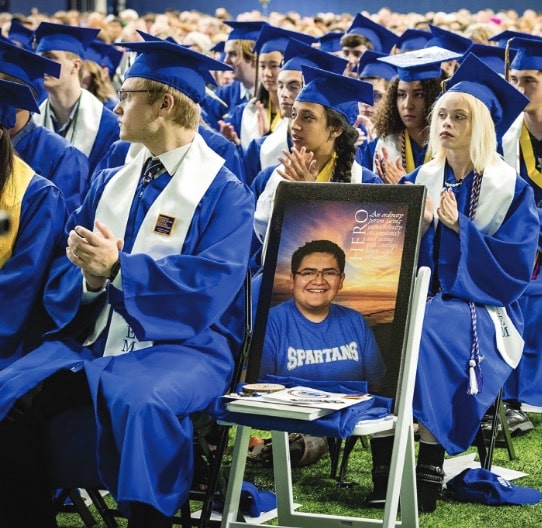
Every hero is blessed with unique gifts and talents that serve as preparation for a mission. That mission invariably involves self-discipline and sacrifice for the sake of others — people whom the hero is charged to protect and serve.
In the Catholic Church, we believe that holiness and heroism go hand in hand. We call these heroes saints. But the Second Vatican Council reminded us that heroic virtue — that is, holiness — is a universal vocation. The call to action is at the heart of our identity in Christ.
On May 7, Kendrick Castillo was shot and killed after rushing toward a shooter at STEM School Highlands Ranch in Colorado. Castillo was the lone fatality, and police said that his actions saved lives.
When Kendrick Castillo answered the call in his classroom, it embodied how, at a young age, he already had chosen to live his life. It was a life devoted to the care and concern of others, a life devoted to his family and a life devoted to Jesus Christ and his Church. In the days following Kendrick’s death, the world discovered what his family and friends already knew: Kendrick was a faithful Catholic with a heart of gold.
His father, John, is a member of the Knights of Columbus, and together they volunteered for a combined 2,600 hours of service. John said Kendrick “wanted to be a Knight of Columbus because he wanted to help not only people but his community.” In his final moments, Kendrick did both, which makes him a perfect choice to be named one of the Catholics of the Year by Our Sunday Visitor.
At our supreme convention in August, I was privileged to present our Caritas Medal to John and Maria Castillo. The award recognizes those who profoundly embrace our order’s principle of charity in their service and sacrifice for others. Kendrick is only the fourth person to receive the medal.
We also fulfilled Kendrick’s wish. By acclimation, we made him a brother Knight.
Before he died, Kendrick wanted to join the Knights of Columbus to be more like us. In the end, we discovered that we want to be more like him.
Carl Anderson is supreme knight of the Knights of Columbus.
ROBERT P. LOCKWOOD
Entertaining and informing readers on matters of faith for decades
By Gretchen R. Crowe
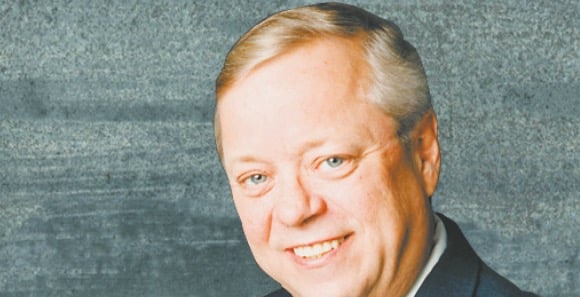
It’s hard to believe it’s almost been a year since Bob Lockwood passed away, and there seems to be no more fitting accolade than to name him one of our 2019 Catholics of the Year.
Longtime readers of Our Sunday Visitor know not only his name but his voice — the voice of his written word. For decades, Lockwood penned the biweekly column “Catholic Journal” for this newspaper, in which he wrote about all things pertaining to the Faith.
“He was the poet laureate of growing up Catholic in the early 1960s, and he had a knowing affection for ordinary Catholics living their faith without fanfare or controversy,” said Greg Erlandson, director and editor-in-chief of Catholic News Service and a former president and publisher of OSV, at the time of his death. “In his columns and books, he knew how both to delight and instruct, always with a gentle touch.”
Lockwood spent nearly 30 years of his distinguished career in Catholic communications at OSV, working his way up from assistant editor to president of the company’s Publishing division. In that time, he developed three new magazines — The Catholic Answer, Catholic Heritage and Catholic Parent — and added New Covenant and U.S. Catholic Historian to its line of periodicals. He also expanded Our Sunday Visitor’s religious books line into major reference works, such as Our Sunday Visitor’s Catholic Encyclopedia and Our Sunday Visitor’s Encyclopedia of Catholic Doctrine. After resigning from OSV in 1999, Lockwood worked briefly for the Catholic League for Religious and Civil Rights, followed by several years as communications director for the Diocese of Pittsburgh. Upon retirement in 2014, he moved back to Indiana, which had become synonymous with “home.”
Lockwood died March 4 at the age of 69, leaving behind many who miss him dearly. His words, though, live on in Our Sunday Visitor’s archives and in our hearts.
Gretchen R. Crowe is editorial director for periodicals at OSV.
SISTER STEPHANIE BALIGA
Serving Chicago’s poor by running toward God
By Scott P. Richert
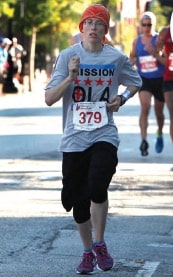
Chicago Marathon. Karen Callaway/Chicago
Catholic
“Lord, you have called me; here I am.” On Sept. 4, 2016, Stephanie Baliga spoke those words in the Mission of Our Lady of the Angels, in the West Humboldt Park neighborhood of Chicago. A crowd of hundreds, from all walks of life and several states, had gathered to witness her final profession of vows as a perpetual member of the Franciscans of the Eucharist of Chicago. Each had been touched by Sister Stephanie, by her infectious joy and her glowing faith.
Sister Stephanie was once on a very different path. A cross-country runner from the age of 9, she excelled at the sport in high school and, as a freshman at the University of Illinois, walked on to the Illini women’s cross-country team. Like many Catholics of her generation (she’s 31), Sister Stephanie spent a lot of time running from God — in her case, quite literally, because running had become a god to her.
A broken bone in her foot gave her the chance to reexamine her priorities, and on a retreat in her sophomore year, Sister Stephanie was overwhelmed by the Real Presence of Christ in the Eucharist. After graduation, she joined the Franciscans at the Mission of Our Lady of the Angels and never looked back.
But along the way, God, she says, gave “running back to me as a gift that I’m able to use for him.” In 2011, Sister Stephanie created Team OLA to compete in the Chicago Marathon and raise money for the mission. In eight years, Team OLA has raised more than $800,000, all of which has been used to support the work of the mission in bringing Christ to the poorest of the poor.
In a year in which belief in the Real Presence has reached an all-time low among American Catholics, Sister Stephanie Baliga, one of our 2019 Catholics of the Year, is living proof that encountering Christ in the Eucharist can change your life.
Scott P. Richert is publisher for OSV.
JUSTICE CLARENCE THOMAS
Defending the unborn from the highest court in the land
By Russell Shaw
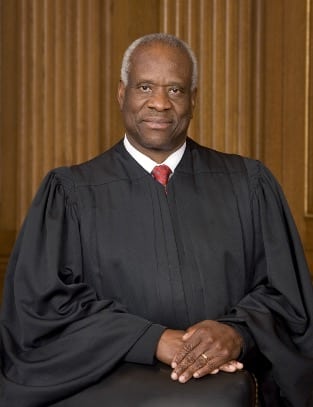
In 28 years on the Supreme Court, Justice Clarence Thomas has established himself as a powerful voice in defense of unborn human life. That was clear again last May when he issued a scathing concurring opinion tracing the link between abortion and eugenics. From the start of the birth control movement, he pointed out that “birth control and abortion were promoted as means” of cutting down on births among certain groups.
It’s easy to see the personal history behind Thomas’ strong feelings. Born in 1948 near Savannah, Georgia, Thomas from an early age was raised by his maternal grandparents and attended an all-African American Catholic school in Savannah where he was taught by nuns. After a brief time in the seminary, he studied at Holy Cross College in Massachusetts and Yale University, where he received his law degree.
His professional career included assistant attorney general of Missouri, legislative assistant to U.S. Sen. John Danforth of Missouri, assistant secretary in the U.S. Department of Education, and chairman of the Equal Employment Opportunity Commission. He was a judge on the U.S. Court of Appeals in Washington, D.C., when in 1991 President George H.W. Bush named him to the Supreme Court, the second African American to serve there.
One of his first big cases on the high court was Planned Parenthood v. Casey (1992) in which he joined Justice Antonin Scalia in dissenting from the majority’s decision supporting abortion.
In his opinion last May, Justice Thomas pointed to the “racial disparity” in abortion, with the ratio of abortions to live births far higher among black women than among white women. Whatever the reason, he wrote, that suggests that, insofar as abortion is considered a method of family planning, black people “take the brunt of the ‘planning.'”
For his unwavering defense of the unborn, Our Sunday Visitor honors him as being among the Catholics of the Year in 2019.
Russell Shaw is a contributing editor for Our Sunday Visitor.

